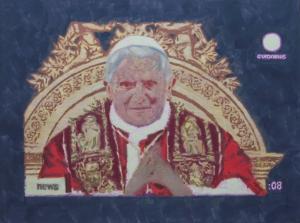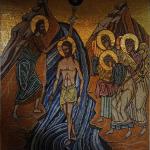
The funeral for Pope-Emeritus Benedict XVI brings to a conclusion a rather difficult era for Catholicism. While Benedict was no longer Pope, and consistently pointed that out, many of his would-be followers did not want to believe this and acted as if he were the true Pope, ignoring or denouncing Pope Francis. During this time, we also saw that some of those who reluctantly admitted that Benedict XVI had legitimately resigned from the papacy and acknowledged Francis was Pope nonetheless wanted to pit the two against each other. They found themselves trying to use Benedict to criticize Pope Francis and the reforms Pope Francis has brought to the church. We can see an example of this when Ignatius Press tried to have Benedict listed as an author of a book written by Cardinal Sarah, a book which also was seen as written to fight against some of Pope Francis’s agenda. While many can and will still use the words of Benedict in such a way far into the future, they now cannot use him in such a fashion anymore.
Truly, we have come to the end of an era even as we find ourselves beginning a new one. Now, instead of using Benedict to oppose Francis, some will claim Francis is not truly the Pope, that Benedict really was the Pope until he died. Benedict will not be able to respond to them as he did while he was alive, and so that idea can ferment and be used by some to try to elect someone else as a pretender to the papacy. Indeed, this might already happening; it appears that Steve Bannon, the political manipulator, is trying to flex his muscles and impose his will upon the church. Thus, just as he helped put a fascist in power in Italy, it seems as if he wants to put a right-wing ideologue into the papacy. If he got his way, he would put in autocratic, far-right ideologues in positions of power all over the word so as to transform the world into a dark, autocratic dystopia. While it is true that many will ignore such an anti-Pope, we find ourselves in such a situation, especially in the United States, where the voices against Pope Francis have made it likely that at least some would go into schism if such an anti-Pope is elected. The fact that many Catholic parishes, and bishops, seem to ignore Pope Francis, and rarely present to the faithful the initiatives of Francis, it is easy to see how many Catholics have been set up to go along with such a schism. It certainly might not happen, and if it happens, it probably will not meet with much immediate success (for most will acknowledge the ecclesiological error involved, and those who would otherwise support it, will bide their time and hope to take advantage of the situation when Francis resigns or dies). Nonetheless, it seems as if a precedent is beginning to emerge, one which foreshadows a crisis that the church will have to deal with in the future. It is a crisis which will likely be noticeable in American Catholicism, as there is a already disconnect between American bishops and the Vatican (with many “rogue” bishops in the US enjoying Francis’ rather hands-off approach to their activities).
Benedict had an image which many of his supporters and critics used for their own benefit. While there was some truth to the image, as it could not have been made up without something to suggest it, it certainly hindered him from doing his best, leaving some of his most important contributions overshadowed by how he was represented to the public. His supporters did not want to hear about climate change or his presentation of social doctrine, while his critics often saw him and his policies not going far enough to reform the church. Indeed, many, from both sides of the spectrum, saw him unable to deal with the sexual abuse crisis in the church, and they understood the reason why is that he was more of a scholar than a pastor. His treatment of women religious in the United States, and the people he elevated to the bishopric, also demonstrated how his policies helped shape and create the crisis which was to come after he resigned from his office.
It must not be said that Benedict did not understand the need for pastoral concessions – he did, and often, when he engaged them, he found his otherwise conservative supporters upset at what he said, such as when he gave a more nuanced approach to condom use. And though he was designated the Green Pope, setting the stage for Pope Francis and Laudato si’, once again, such work was routinely ignored and not given its proper presentation in Catholic circles, which is why many Catholics would ignore or oppose Pope Francis’ environmental efforts, acting as if they proved Francis was a liberal who was not to be trusted. All in all, it appears that many of Benedict’s supporters only wanted him to be authoritarian, one who could and would be used to denounce ideological opponents, and not the pastor who recognized the need for charity and pluralism within the church.
Benedict, therefore, leaves us a mixed legacy. He was more an intellectual than a pastor, and that showed in his approach to theology and church government. There is much which one can find invaluable in his encyclicals, insights which, once again, many of his fans ignored or rejected, but there is also much which one can find questionable and concerning in the way he handled ecclesiastical government. He had to deal with the sex abuse crisis, and though he showed he was able to do so better than Pope St. John Paul II, represented in the immediate action he took in regards Marcial Maciel once he was Pope, he could not grasp the full problem and the reforms which were needed to bring healing to the church. Indeed, he let own ideological understanding turn the issue into a problem which emerged from the sexual revolution of the 60s instead of seeing the power dynamic which lead to sexual abuse. But, recognizing there was a problem, and trying to deal with it, set the stage for the church to be further reformed, even if that reform is slow, and has not gone far enough. Benedict, moreover, left behind three important encyclicals which dealt with a few of the grave threats of the modern age, among which are the threat of social injustice, the threat of a world destroyed by capitalistic consumerism which was indifferent to the environment, and the threat of despair. Pope Francis took up these concerns and developed the church’s response to them, proving that Francis’ papacy is continuity with and follows the directions established by Benedict. Those who try to make an opposition between the two just used Benedict as a figurehead for their complaints against the “liberalism” they find preached by Francis; they had created a false image of Benedict, and never allowed that image to be transformed or corrected by facts. And so, we had an era of the imagined-Benedict pitted against Francis. It is an era which is over. This does not mean things will get better. It might only be the beginning of a new, worse era, especially if those who ignored Francis by using Benedict now just ignore Francis without any pretense of support from Benedict. They will move themselves further from the direction the Holy Spirit is moving the church, and in that way, become a more hostile, negative force, not only in the church, but in the world.
Stay in touch! Like A Little Bit of Nothing on Facebook.
If you liked what you read, please consider sharing it with your friends and family!
N.B.: While I read comments to moderate them, I rarely respond to them. If I don’t respond to your comment directly, don’t assume I am unthankful for it. I appreciate it. But I want readers to feel free to ask questions, and hopefully, dialogue with each other. I have shared what I wanted to say, though some responses will get a brief reply by me, or, if I find it interesting and something I can engage fully, as the foundation for another post. I have had many posts inspired or improved upon thanks to my readers.













